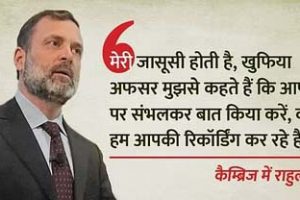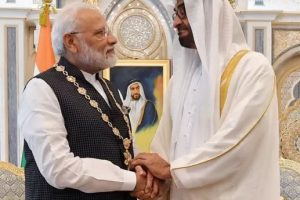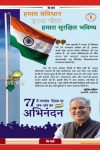Ishwari Baral is an online journalist in Nepal’s capital Kathmandu. Ishwari has been very angry with India for the last few years. She says that because of this resentment, she supports the Pakistani cricket team. Ishwari belongs to Lamjung, a mountainous region in Nepal.
Rajkishore Yadav is from Siraha district of Madhesi area. He is the leader of Baburam Bhattarai’s Janata Samajwadi Party. Rajkishore Yadav says that Ishwari is doing this in reaction.
Says Rajkishore, “An attempt has been made to create a Narrative in the middle of the hills in Nepal that India is an expansionist power and need to be vigilant.” Communist parties have done this in the greed of power. I do not think that the cricket match should be between Pakistan and India and someone will support Pakistan in Madhes. It is also not true that there is only anti-India sentiment in the mountain. The Gurkhas are hilly and bravely engaged in the defense of the outskirts of the Indian Army. But it is so important that the thinking about India is not the same in the mountains and Madhes. “Pali Gorkha is in the Indian Army only from British India. Gorkhas played an important role in Gorkha-Sikh, Anglo-Sikh and Afghan war.
Apart from this, the contribution of Gurkhas was also important in the 1971 India-Pakistan war. The Gurkhas’ entry into the Indian Army is linked to the Sugauli Treaty that took place after the Anglo-Nepalese War in 1816. At that time, India was the slave of the British and the Gurkhas challenged the British rule hard.
When India became independent, six Gorkha regiments were handed over to the Indian Army in a tripartite agreement between Nepal, India and Britain. The seventh regiment joined after independence. At present there are about 32 thousand Gurkhas in 40 battalions of seven Gorkha regiments.
Rajkishore says that Kathmandu is far away for Madhesis, but Delhi is much closer. Yuvraj Chaulgai is a central member of the Nepal Communist Party (Prachanda faction) and is the chairman of the Nepali Migration Coordination Committee. Yuvraj says that resentment about India is not just a reaction.
They say that there are solid reasons for this. Yuvraj says, “India’s government must accept that Nepal is a sovereign country. When Nepal was implementing the constitution in 2015, the current foreign minister of India was then foreign secretary and he insisted on not coming to Nepal without calling and enforcing the constitution. He objected that Nepal should not become a secular state from Hindu nation and there were some concerns about Madhesis. ”
Yuvraj asks, “We have to remain a Hindu nation or a secular state, will it decide the government of India or the elected government of Nepal?” India has been doing micromanagement in Nepal’s politics and the present government of India is doing the same. S Jaishankar, while being foreign secretary, had appeared strangely in front of the leadership of Nepal regarding the constitution. India needs to get rid of micromanagement strategy in Nepal’s politics. “On 26 May 2006, the then BJP President Rajnath Singh said,” Nepal’s original identity is that of a Hindu nation and not to let this identity disappear. needed. BJP will not be happy that Nepal loses its original identity under pressure from Maoists. ”
Yuvraj says, “You understand this chronology. In October last year, Samant Kumar Goel, the head of India’s intelligence agency RAW (Research Analysis Wing) met PM Oli. Then General Narwane, the Army Chief of India met. After this, Foreign Secretary came. After this, BJP’s foreign affairs in-charge Vijay Chaturwale met Oli. All these visits were confidential. Some details were not given. Then suddenly on 20 December PM Oli dissolved the Parliament. He does not have a majority yet, but is sitting in the Prime Minister’s chair in violation of the Constitution. It is obvious that Oli cannot live with such vigor without foreign support. “Lokraj Baral, Nepal’s ambassador to India, says that in 2015, the foreign secretary of India, S Jaishankar, with the Nepali leadership, behaved in such a manner. That was not right.
Lokraj Baral says, “There are solid reasons for the anti-India sentiment in Nepal.” Nepal was implementing its constitution for the first time as a democratic republic. It is possible that there are some shortcomings in the constitution, but with time these shortcomings would be overcome. Concerns about Madhesis were valid, but you cannot say that the Constitution should be stopped. ”Baral says that due to the attitude of S. Jaishankar, all political parties in Nepal were united and a consensus was reached about the Constitution. “In response to this, India imposed a blockade,” says Baral. India knew that due to blockade there is shortage of essential goods in Nepal and humanitarian crisis arises. Despite this, India did this. In such a situation, if the anti-India sentiment in Nepal is strong, then the Indian government should think whose fault it is. ”
Dr. Sanduk Ruit is a world-renowned eye surgeon from Nepal. Sanduk has treated the poor for free in many parts of the world including India. He has also received the Ramon Magsaysay Award.
Sanduk recalls India’s unannounced blockade in 2015, saying, “It was very scary.” There used to be silence during the day on the streets of Kathmandu. There was a long line of several kilometers to take petrol and diesel. Seeing the cooking gas line, the person used to cry tears of blood. India knows that Nepal’s life depends on it and its blockade creates a humanitarian crisis. “In Russia Hiranya Lal Shrestha says that India also bothers Nepal and wants Nepal not to reduce its dependence on it. He says, “If you will suddenly blockade and we are also bereft of food and drink, then we have to look for another option.” We need to see how to strengthen the transit route from China. We cannot pledge our pride by depending on India. Nepalese also have the right to live with self-respect.
During an informal conversation, a former Nepal diplomat said that India is not able to stop China here, what will stop it in Nepal. He said, “The Chinese army has entered Ladakh and has established a village in Arunachal. Therefore leave Nepal’s worry and India should worry first.
Former Nepal Foreign Minister Ramesh Nath Pandey told BBC Hindi that he had asked India’s first Prime Minister Jawaharlal Nehru why he mentions the Himalayas so much in his speeches during his visit to Nepal? Ramesh Nath Pandey asked Nehru whether he was influenced by the beauty of the Himalayas or was afraid of the neighboring country. According to Pandey, Nehru had said in response that both are there. From Nehru to Nepal, India’s apprehension has remained about China. But Nepal feels that India takes advantage of its dependency, so there is a need to strengthen the transit route with China.
The foundation of diplomatic relations was laid on 1 August 1955 between Nepal and China. There is a 1,414 km long border between the two countries. This border between Nepal and China is surrounded by high and snowy mountains. This line of the Himalayas covers 16.39% of the area of Nepal.
This range is in the Himalayan range of the northern part of Nepal. Although this border was between Nepal and Tibet, China also made Tibet its part. Nepal has always been sensitive to China. Nepal has followed the One China policy and has taken steps according to China.
On 21 January 2005, the government of Nepal closed the representative office of the Dalai Lama, known as the Tibetan Refugee Welfare Office. The US Embassy in Kathmandu had raised a strong objection to this, but Nepal remained firm in its decision. China welcomed Nepal’s decision.
During the India-China war of 1962, Nepal kept itself neutral. Nepal refused to take anyone’s side. Nepali diplomat Hiranya Lal Shrestha says that there was complete pressure of India that Nepal should openly join India in this war.
Hiranya Lal Shrestha has written in his book ’60 Years of Dynamic Partnership’, “Nepal entered into an agreement with China on 15 October 1961 to create a road link between the two countries.” Under this, there was talk of building an Eranico highway from Kathmandu to Khasa. Many western countries including India also opposed this agreement. According to the agreement, China built the Eranico Highway and it was opened in 1967. It is said that this road was built by the Chinese Army People’s Liberation Army. This was the beginning of reducing dependence from India.
However, this highway is called the most dangerous road in the world. Landslides occur continuously here and often this road is closed. Nepal does business with China through this route, but it is very difficult. Due to heavy rains here, landslides are common here. This 144 km long road is in a very steep slope and it is said that driving on it is like risking life.
China is Nepal’s second largest trade partner. Despite this, however, the size of the business is very small. According to Nepal’s Foreign Ministry, in 2017-18, Nepal exported a total of $ 23 million from China. In the same period, Nepal imported $ 1.5 billion from China. Nepal’s trade deficit with China is steadily increasing.
However, China allows 8,000 Nepalese products to arrive at no charge since 2009. According to the Foreign Ministry of Nepal, China is the largest source of FDI in Nepal. In March 2017, at the Nepal Investment Summit held in Kathmandu, Chinese investors promised investment of $ 8.3 billion. China is the second largest source of foreign tourists in Nepal. In 2018, 164,694 Chinese tourists visited Nepal. From January 1, 2016, the government of Nepal abolished visa fees for Chinese tourists.
In 1989, Rajiv Gandhi’s government imposed an economic blockade in response to the Nepal and China Transit Treaty and increasing poverty. Hiranya Lal Shrestha has written in his book ’60 Years of Dynamic Partnership’, “In November 1989, Chinese Prime Minister Li Peng visited Nepal. Then India imposed economic blockade on Nepal and there was a lot of tension in both the countries. Nepal had decided to import arms from China, that’s why Rajiv Gandhi’s government imposed a blockade. On a difficult day, Chinese Premier Li came to Nepal and announced all possible help with sympathy. On November 21, 1989, Li Peng held a press conference in Kathmandu and said that China had provided military equipment to its friend nations. We want to strengthen those countries which have security concerns. Sending security equipment is an absolutely right decision and it is not against any country. India should understand that take mangoes of Nepal from blockade
नेपाल में क्यों बढ़ रही है भारत विरोधी भावना? चीन में बढ़ी दिलचस्पी
ईश्वरी बराल नेपाल की राजधानी काठमांडू में ऑनलाइन पत्रकार हैं. पिछले कुछ सालों से ईश्वरी भारत से बहुत नाराज़ हैं. वे बताती हैं कि इसी नाराज़गी के कारण वो पाकिस्तानी क्रिकेट टीम का समर्थन करती हैं. ईश्वरी नेपाल में पहाड़ी इलाक़े लामजुंग की हैं.
राजकिशोर यादव मधेसी इलाक़े के सिराहा ज़िले के हैं. वो बाबूराम भट्टराई की जनता समाजवादी पार्टी के नेता हैं. राजकिशोर यादव कहते हैं कि ईश्वरी रिएक्शन में ऐसा कर रही हैं. राजकिशोर कहते हैं, ”नेपाल में पहाड़ियों के बीच एक नैरेटिव गढ़ने की कोशिश की गई है कि भारत विस्तारवादी शक्ति है और उससे सतर्क रहने की ज़रूरत है. ऐसा कम्युनिस्ट पार्टियों ने सत्ता के लालच में किया है. मुझे नहीं लगता है कि क्रिकेट मैच पाकिस्तान और भारत के बीच हो और मधेस में कोई पाकिस्तान का समर्थन करेगा. ये भी सच नहीं है कि पहाड़ में केवल भारत विरोधी भावना है. गोरखा तो पहाड़ी ही हैं और भारतीय सेना में बहादुरी के साथ सरहद की रक्षा में लगे हुए हैं. लेकिन इतना ज़रूर है कि अभी भारत को लेकर पहाड़ और मधेस में सोच एक जैसी नहीं है.” पाली गोरखा ब्रिटिश इंडिया से ही भारतीय सेना में हैं. गोरखाओं ने गोरखा-सिख, एंग्लो-सिख और अफ़ग़ान युद्ध में अहम भूमिका निभाई थी.
इसके अलावा 1971 के भारत-पाकिस्तान युद्ध में भी गोरखाओं का योगदान महत्वपूर्ण रहा. भारतीय सेना में गोरखाओं की एंट्री 1816 में एंग्लो-नेपाली वॉर के बाद हुई सुगौली संधि से जुड़ी है. तब भारत अंग्रेज़ों का ग़ुलाम था और गोरखाओं ने ब्रिटिश हुक़ूमत को कड़ी चुनौती दी थी.
जब भारत आज़ाद हुआ, तो नेपाल, भारत और ब्रिटेन के त्रिपक्षीय क़रार में छह गोरखा रेजिमेंट्स भारतीय सेना के हवाले किए गए. सातवाँ रेजिमेंट आज़ादी के बाद शामिल हुआ. वर्तमान में सात गोरखा रेजिमेंट के 40 बटालियन में क़रीब 32 हज़ार गोरखा हैं.
राजकिशोर कहते हैं कि मधेसियों के लिए काठमांडू दूर है, लेकिन दिल्ली ज़्यादा क़रीब है. युवराज चौंलगाईं नेपाल कम्युनिस्ट पार्टी (प्रचंड गुट) के केंद्रीय सदस्य हैं और नेपाली प्रवास समन्वय समिति के अध्यक्ष हैं. युवराज कहते हैं कि भारत को लेकर नाराज़गी केवल प्रतिक्रियावश नहीं है.
वे कहते हैं कि इसके ठोस कारण हैं. युवराज कहते हैं, ”भारत की सरकार को यह स्वीकार करना होगा कि नेपाल एक संप्रभु देश है. 2015 में नेपाल जब संविधान लागू कर रहा था, तो भारत के वर्तमान विदेश मंत्री तब विदेश सचिव थे और वे बिना बुलाए नेपाल आकर संविधान नहीं लागू करने की ज़िद करने लगे. उन्हें इस बात पर आपत्ति थी कि नेपाल हिंदू राष्ट्र से सेक्युलर स्टेट ना बने और मधेसियों को लेकर कुछ चिंताएँ थीं.”
युवराज पूछते हैं, ”हमें हिंदू राष्ट्र रहना है या सेक्युलर स्टेट, ये भारत की सरकार तय करेगी या नेपाल की चुनी हुई सरकार? नेपाल की राजनीति में भारत माइक्रोमैनेजमेंट करता आया है और भारत की वर्तमान सरकार भी वही कर रही है. एस जयशंकर विदेश सचिव रहते हुए संविधान को लेकर नेपाल के नेतृत्व के सामने अजीब तरीक़े से पेश आए थे. भारत को नेपाल की राजनीति में माइक्रोमैनेजमेंट की रणनीति से बाज आने की ज़रूरत है.” 26 मई 2006 को बीजेपी के तत्कालीन अध्यक्ष राजनाथ सिंह ने कहा था, ”नेपाल की मौलिक पहचान एक हिंदू राष्ट्र की है और इस पहचान को मिटने नहीं देना चाहिए. बीजेपी इस बात से ख़ुश नहीं होगी कि नेपाल अपनी मौलिक पहचान माओवादियों के दबाव में खो दे.”
युवराज कहते हैं, ”आप इस क्रोनोलॉजी को समझिए. पिछले साल अक्तूबर महीने में भारत की ख़ुफ़िया एजेंसी रॉ (रिसर्च एनलिसिस विंग) के प्रमुख सामंत कुमार गोयल पीएम ओली से मिले. फिर भारत के सेना प्रमुख जनरल नरवणे मिले. इसके बाद विदेश सचिव आए. इसके बाद बीजेपी के विदेशी मामलों के प्रभारी विजय चौथाईवाले ने ओली से मुलाक़ात की. ये सारी मुलाक़ातें गोपनीय हुईं. कुछ डिटेल नहीं दी गई. फिर अचानक से 20 दिसबंर को पीएम ओली ने संसद को भंग कर दिया. अभी उनके पास बहुमत नहीं है, लेकिन संविधान का उल्लंघन करते हुए प्रधानमंत्री की कुर्सी पर बैठे हुए हैं. ज़ाहिर सी बात है कि ओली बिना विदेशी समर्थन के इतनी अकड़ के साथ नहीं रह सकते.” भारत में नेपाल के राजदूत रहे लोकराज बराल कहते हैं कि 2015 में भारत के विदेश सचिव एस जयशंकर नेपाली नेतृत्व के सामने जिस तेवर से पेश आए थे, वो ठीक नहीं था.
लोकराज बराल कहते हैं, ”नेपाल में भारत विरोधी भावना के ठोस कारण हैं. नेपाल पहली बार लोकतांत्रिक गणराज्य के रूप में अपना संविधान लागू कर रहा था. संभव है कि संविधान में कुछ कमियाँ हों, लेकिन वक़्त के साथ ये कमियाँ दूर हो जातीं. मधेसियों को लेकर चिंताएँ जायज़ थीं, लेकिन आप ये नहीं कह सकते कि संविधान रोक दीजिए.” बराल कहते हैं कि एस जयशंकर के रुख़ के कारण ही नेपाल की सारी राजनीतिक पार्टियाँ एकजुट हो गई थीं और संविधान को लेकर आम सहमति बन गई. बराल कहते हैं, ”इसकी प्रतिक्रिया में भारत ने नाकेबंदी लगा दी. भारत को पता था कि नाकेबंदी के कारण नेपाल में ज़रूरी सामानों की किल्लत हो जाती है और मानवीय संकट खड़ा हो जाता है. इसके बावजूद भारत ने ऐसा किया. ऐसे में नेपाल में अगर भारत विरोधी भावना मज़बूत होती है, तो भारत की सरकार को सोचना चाहिए कि ग़लती किसकी है.”
डॉ संदुक रुइत नेपाल के विश्व विख्यात आइ सर्जन हैं. संदुक ने भारत समेत दुनिया के कई हिस्सों में ग़रीबों का मुफ़्त में इलाज किया है. उन्हें रेमन मैग्सेसे अवॉर्ड भी मिला है.
संदुक 2015 में भारत की अघोषित नाकेबंदी को याद करते हुए कहते हैं, ”बहुत ही डरावना था. काठमांडू की सड़कों पर दिन में सन्नाटा पसरा रहता था. पेट्रोल और डीजल लेने के लिए कई किलोमीटर की लंबी लाइन लगती थी. रसोई गैस की लाइन देख इंसान ख़ून के आँसू रो जाता था. भारत को पता है कि नेपाल का जनजीवन उसी पर निर्भर है और उसकी नाकेबंदी मानवीय संकट पैदा करती है.” रूस मे नेपाल के राजदूत रहे हिरण्य लाल श्रेष्ठ कहते हैं कि भारत नेपाल को परेशान भी करता है और चाहता है कि नेपाल उससे अपनी निर्भरता भी कम ना करे. वे कहते हैं, ”अगर आप अचानक से नाकाबंदी करेंगे और हम खाने-पीने के सामान से भी महरूम हो जाएँ, तो हमें कोई दूसरा विकल्प देखना होगा. हमें देखना होगा कि चीन से ट्रांजिट रूट को कैसे मज़बूत किया जाए. हम भारत पर निर्भर रहकर अपना स्वाभिमान गिरवी नहीं रख सकते. नेपालियों को भी स्वाभिमान से जीने का हक़ है.”
नेपाल के एक पूर्व डिप्लोमेट ने अनौपचारिक बातचीत के दौरान कहा कि भारत अपने यहाँ तो चीन को रोक ही नहीं पा रहा है, नेपाल में क्या ख़ाक रोकेगा. उन्होंने कहा, ”लद्दाख़ में चीनी फ़ौज घुसी हुई है और अरुणाचल में गाँव बसा लिया है. इसलिए नेपाल की चिंता छोड़ भारत पहले अपनी चिंता करे.”
नेपाल के पूर्व विदेश मंत्री रमेशनाथ पांडे ने बीबीसी हिंदी से कहा कि उन्होंने भारत के पहले प्रधानमंत्री जवाहरलाल नेहरू से पूछा था कि वो नेपाल दौरे पर अपने भाषणों में हिमालय का इतना ज़िक्र क्यों करते हैं? रमेशनाथ पांडे ने नेहरू से पूछा था कि वो हिमालय की ख़ूबसूरती से प्रभावित हैं या उसके पार के पड़ोसी देश से डरे रहते हैं. पांडे के अनुसार, नेहरू ने जवाब में कहा था कि दोनों बातें हैं. नेहरू से लेकर अब तक नेपाल में चीन को लेकर भारत की आशंका बनी रही है. लेकिन नेपाल को लगता है कि भारत उसकी निर्भरता का फ़ायदा उठाता है, इसलिए चीन के साथ ट्रांजिट रूट को और मज़बूत करने की ज़रूरत है.
नेपाल और चीन के बीच एक अगस्त 1955 को राजनयिक रिश्ते की बुनियाद रखी गई. दोनों देशों के बीच 1,414 किलोमीटर लंबी सीमा है. नेपाल और चीन के बीच की यह सीमा ऊँचे और बर्फ़ीले पहाड़ों से घिरी हुई है. हिमालय की इस लाइन में नेपाल के 16.39 फ़ीसदी इलाक़े आते हैं.
यह सीमा नेपाल के उत्तरी हिस्से के हिमालयन रेंज में है. हालाँकि यह सीमा नेपाल और तिब्बत के बीच थी, लेकिन चीन ने तिब्बत को भी अपना हिस्सा बना लिया था. नेपाल हमेशा से चीन को लेकर संवेदनशील रहा. वन चाइना पॉलिसी का नेपाल ने हर हाल में पालन किया है और चीन के हिसाब से क़दम भी उठाया है.
21 जनवरी 2005 को नेपाल की सरकार ने दलाई लामा के प्रतिनिधि ऑफिस, जिसे तिब्बती शरणार्थी कल्याण कार्यालय के नाम से जाना जाता था, उसे बंद कर दिया. काठमांडू स्थित अमेरिकी दूतावास ने इसे लेकर कड़ी आपत्ति जताई थी, लेकिन नेपाल अपने फ़ैसले पर अडिग रहा. चीन ने नेपाल के इस फ़ैसले का स्वागत किया था.
1962 के भारत-चीन युद्ध के समय नेपाल ने ख़ुद को तटस्थ रखा. नेपाल ने किसी का पक्ष लेने से इनकार कर दिया. नेपाली डिप्लोमैट हिरण्य लाल श्रेष्ठ कहते हैं कि भारत का पूरा दबाव था कि इस जंग में भारत के साथ नेपाल खुलकर आए.
हिरण्य लाल श्रेष्ठ ने अपनी किताब ’60 इयर्स ऑफ़ डायनेमिक पार्टनर्शिप’ में लिखा है, ”नेपाल ने चीन के साथ 15 अक्तूबर 1961 को दोनों देशों के बीच रोड लिंक बनाने के लिए एक समझौता किया. इसके तहत काठमांडू से खासा तक एरानिको हाइवे बनाने की बात हुई. इस समझौते का भारत समेत कई पश्चिमी देशों ने भी विरोध किया. समझौते के हिसाब से चीन ने एरानिको हाइवे बनाया और इसे 1967 में खोला गया. कहा जाता है कि इस सड़क का निर्माण चीनी सेना पीपल्स लिबरेशन आर्मी ने किया. यह भारत से निर्भरता कम करने की शुरुआत थी.”
हालाँकि इस हाइवे को दुनिया का सबसे ख़तरनाक रोड कहा जाता है. भूस्खलन यहाँ लगातार होता है और अक्सर यह सड़क बंद रहती है. नेपाल इसी रूट के ज़रिए चीन से कारोबार करता है, लेकिन ये बहुत ही मुश्किल है. यहाँ भारी बारिश होती है जिससे, भूस्खलन यहाँ आम बात है. 144 किलोमीटर लंबी यह सड़क एकदम खड़ी ढाल में है और कहा जाता है कि इस पर गाड़ी चलाना जान जोखिम में डालने की तरह है.
चीन नेपाल का दूसरा सबसे बड़ा ट्रेड पार्टनर है. हालाँकि इसके बावजूद कारोबार का आकार बहुत छोटा है. नेपाल के विदेश मंत्रालय के अनुसार 2017-18 में नेपाल ने चीन से कुल 2.3 करोड़ डॉलर का निर्यात किया. इसी अवधि में नेपाल ने चीन से डेढ़ अरब डॉलर का आयात किया. नेपाल का चीन से कारोबार घाटा लगातार बढ़ रहा है.
हालाँकि चीन 2009 से 8,000 नेपाली उत्पादों को बिना कोई शुल्क के आने देता है. नेपाल के विदेश मंत्रालय के अनुसार नेपाल में प्रत्यक्ष विदेशी निवेश यानी एफ़डीआई का सबसे बड़ा स्रोत चीन है. मार्च 2017 में काठमांडू में आयोजित नेपाल इन्वेस्टमेंट समिट में चीनी निवेशकों ने 8.3 अरब डॉलर के निवेश का वादा किया था. नेपाल में विदेशी पयर्टकों का दूसरा सबसे बड़ा स्रोत चीन है. 2018 में 164,694 चीनी पर्यटक नेपाल आए. एक जनवरी, 2016 से नेपाल की सरकार ने चीनी पर्यटकों के लिए वीज़ा शुल्क ख़त्म कर दिया था. 1989 में राजीव गाँधी की सरकार ने नेपाल और चीन ट्रांजिट संधि और बढ़ती क़रीबी की प्रतिक्रिया में आर्थिक नाकेबंदी लगा दी थी. हिरण्य लाल श्रेष्ठ ने अपनी किताब ’60 इयर्स ऑफ डायनेमिक पार्टनर्शिप’ में लिखा है, ”नवंबर 1989 में चीनी प्रधानमंत्री ली पेंग नेपाल के दौरे पर आए. तब भारत ने नेपाल पर आर्थिक नाकेबंदी लगा दी थी और दोनों देशों में भारी तनाव था. नेपाल ने चीन से हथियार आयात करने का फ़ैसला किया था, इसीलिए राजीव गाँधी की सरकार ने नाकेबंदी लगा दी थी. मुश्किल भरे दिनों में चीनी प्रीमियर ली नेपाल आए और उन्होंने सहानुभूति के साथ हर संभव मदद देने की घोषणा की. 21 नवंबर, 1989 को ली पेंग ने काठमांडू में प्रेस कॉन्फ़्रेंस की और कहा कि चीन ने अपने दोस्त राष्ट्रों को सैन्य उपकरण मुहैया कराया है. हम उन देशों को मज़बूत करना चाहते हैं जिनकी सुरक्षा चिंताएँ हैं. सुरक्षा उपकरणों को भेजना बिल्कुल उचित फ़ैसला है और यह किसी भी देश के ख़िलाफ़ नहीं है. भारत को समझना चाहिए कि नाकेबंदी से नेपाल के आम लो.
रजनीश कुमार
बीबीसी संवाददाता, काठमांडू से






















Add Comment